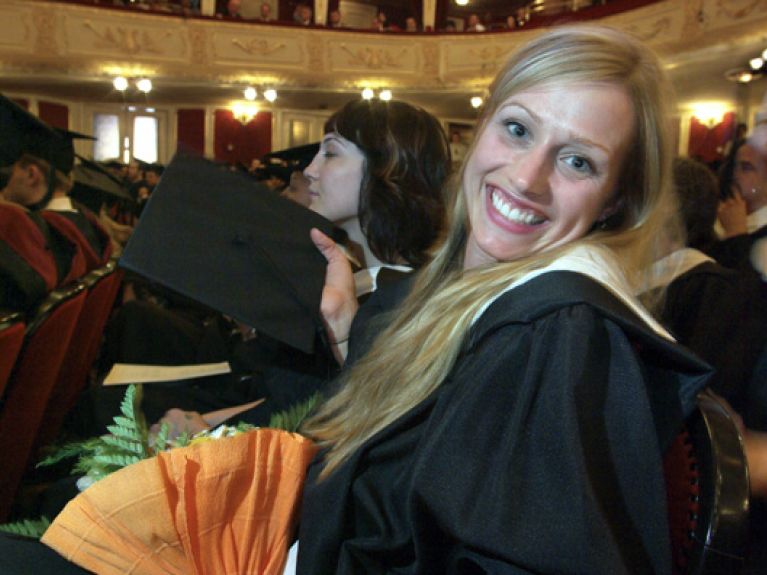Studying without borders
25th anniversary of the Erasmus Programme – a European success story.

Since Ewelina Szymanska began studying in Cologne she has changed quite a lot. She does not only speak much better German than she used to, but her entire personality has developed, thinks the Polish student of German studies. “I have become more daring and more self-confident. At home I had had the feeling of somehow being stuck in a rut.” Ewelina Szymanska came to the University of Cologne in autumn 2011 as an Erasmus scholarship holder – originally for only one semester. But the 24-year-old student was so inspired by the cathedral city that she looked for a part-time job to be able to spend the summer semester there as well. “I find the study conditions very good. And the people here are open-minded and cheerful, and I like that!”
This year the Erasmus Programme is celebrating its 25th anniversary. The then twelve countries of the European Community set up the exchange programme in 1987. Erasmus soon developed into the best known European education and mobility programme: in 2011, over 230,000 students went to another European country with Erasmus, including over 25,000 Germans. If you want to gain international experience with Erasmus you can choose between some 4,000 higher education institutions in 33 countries – in addition to the 27 EU member states, the participating countries also include Croatia, Iceland, Liechtenstein, Norway, Switzerland and Turkey. Since 1987 a total of 2.5 million students have taken part in the exchange programme. “Today gaining international experience is perfectly natural. That is largely thanks to Erasmus,” says Siegbert Wuttig from the German Academic Exchange Service (DAAD), which is responsible for the programme in Germany.
The lawyer Stefan Feiler, head of the Saarland’s Mission at the EU in Brussels, went to the Université de Lausanne in Switzerland in 1994 as a scholarship holder. “During the year abroad I was not under the same pressure as I was as a student in Germany. I had the freedom to concentrate on what interested me most: international and European law,” he recalls. His experience abroad helped him later, initially in gaining an internship with a member of the European Parliament. After graduation he became a member of staff at the European Parliament in Strasbourg and later office manager for two MEPs in Brussels. In his career, believes Feiler, he has been helped significantly by his personal experiences in a shared apartment, where he had to live with a female student from Scotland, a Frenchman, a Swiss woman and a Swede: “You become considerably more open-minded and don’t only see things from the German perspective.”
The Erasmus Programme does not only promote the personal and professional development of participants, but also gives a boost to the internationalization of higher education. “Mass mobility really made demands on German higher education institutions. They have set up International Offices and formed links with universities and colleges abroad. A great deal has changed in that respect,” says Siegbert Wuttig from the DAAD. After all, Erasmus has also improved the mobility of teachers in higher education. “If you want to get students to cross borders, you need lecturers who act as role models and pass on their positive experiences,” says Wuttig. One pleasant side-effect of Erasmus he has noticed is the many international marriages that have resulted: “Europe is growing together in that way too!”
Germany currently ranks third in the popularity table after Spain and France. Roughly 19,000 scholarship holders studied at German higher education institutions in 2011. Most of them came from France, Italy, Poland, Spain and Turkey. German students, on the other hand, mainly go to France, Spain and the UK.
Since 2007, when Erasmus was integrated in the EU programme for lifelong learning, funding has also been available for work placements for students. “Germany has a strong economy and offers diverse opportunities for specialist training,” explains Wuttig. In 2011, some 5,600 interns came to German companies with Erasmus scholarships.
In the next few years it is planned to develop the programme further under the heading “Erasmus for all”. It is also intended to enable up to five million people to study abroad in the years between 2014 and 2020. In addition, it will be possible for entire Master programmes abroad to be funded with loans. The most important development is likely to be the European Commission’s plans to expand exchange to include countries outside Europe. The Erasmus Programme would then open a door to the whole world – another success story in the name of the great European humanist and scholar Erasmus of Rotterdam.

